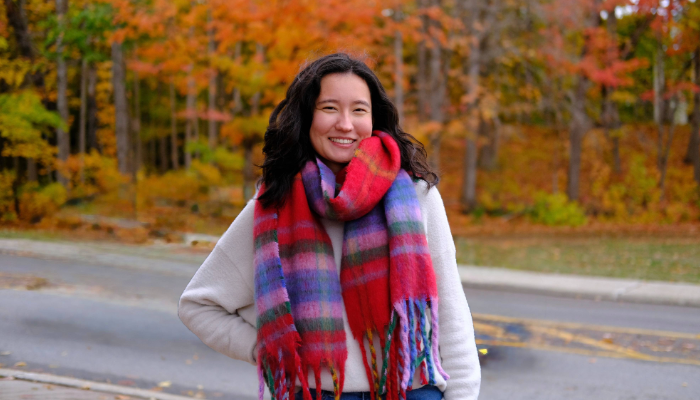Global Undergraduate Awards Spotlight: Renee Guerville
The Global Undergraduate Awards recently announced the winning submissions for 2025, which include the following from Western: one Global Winner, three Regional Winners and 13 Highly Commended.

Renee Guerville
Regional Winner: Psychology
BSc’25 (Honours Specialization in Neuroscience, Major in Psychology)
Paper title: Sensory Reactivity and Sensory Gating of Acoustic Stimuli in a Developmental Population of Autism Spectrum Disorder and Attention Deficit Hyperactivity Disorder
Please provide a brief summary of your paper/research.
My research is focused on sensory processing in neurodevelopmental disorders, specifically in children with autism and ADHD.
I used an EMG to study the acoustic startle response and sensory gating – essentially, how the brain filters out irrelevant stimuli. This process involves the brain automatically filtering background noise out, so we can focus on what’s important. For example, in a crowded room, you can still hear one person speaking to you because your brain filters out other stimuli.
My study found that children with autism and ADHD have altered sensory filtering, and they’re often hyperreactive compared to typically developing children. This has meaningful implications for how neurodivergent children experience the world and for how we design educational and therapeutic environments that support them.
The project sparked a lot of questions about educational applications and how teaching methods might need to adapt to different sensory processing patterns.
What led to your interest in this area?
I started doing research in my second year of university, without any prior experience, and quickly became passionate about it.
I’ve always believed that knowledge is power. The more we understand about how people experience the world, the better we can support and accommodate them. Neurodevelopmental disorders like autism and ADHD shape how individuals process sensory and social information, and understanding that helps create a more inclusive world.
I also grew up in Singapore before moving to Canada at age 12, and I’ve seen firsthand how cultural and societal attitudes toward neurodiversity can affect children. Early intervention, acceptance, and support can make a huge difference. That perspective has really fueled my passion for this field.
What prompted you to submit your paper to the competition?
Dr. Jessica Grahn, the Director of Neuroscience, encouraged me to apply.
At the time, my thesis was already written at a publication-ready level. It’s contributing to multiple papers and to my PhD supervisor’s dissertation. Since I had already formatted and edited it to the standard of an academic journal, it felt like a great fit for the Undergraduate Awards. I figured, “Why not?”
Can you describe how you felt when you found out you'd been selected as a winner?
Honestly, I was aiming just to be “Highly Commended” – so, in the top 10%. When the first announcement came out and I didn’t see my name, I thought, “That’s okay, I tried!”
Then the next day, when I found out I had actually won, I was so happy, and my lab was thrilled too. It was a wonderful surprise!
What are your plans for the future – do you plan to continue in this field?
Yes! I’m currently the Lab Manager for the Sensory Perception Lab at Western, and I’m applying to PhD programs right now.
I plan to continue researching autism and ADHD, with a focus on sensory processing. I’m applying to programs in both Neuropsychology and School & Child Clinical Psychology, so I can keep exploring how sensory and cognitive differences affect learning and behavior.
I think what stands out most for me is how my passion has grown over time. If you had asked me these same questions two years ago, I wouldn’t have been able to answer them like this. Every time I learn something new, I find myself loving this field even more. I feel very lucky to have found something I care about so deeply, and to be able to keep pursuing it.
Will you be attending the Global Summit in Dublin? If so, what are you most looking forward to there?
Yes, I am! It actually worked out perfectly. I was already planning to visit family in London, England, and I had just been talking about taking a weekend trip to Ireland. Then the results came out the next day, and suddenly I had the perfect reason to go!
I’ll be attending part of the summit, and I’m really looking forward to meeting researchers from around the world. Our lab collaborates internationally, so I know how valuable those connections can be. It’ll be exciting to see what others are studying and to build relationships with people working on similar topics globally.
What do you think the benefit of programs like the Undergraduate Awards is for students?
There’s huge value in programs like this – especially for students who want to go into research. Writing a paper for a class is one thing; writing a paper for publication is something entirely different. The process teaches you how to think critically, refine your writing, and communicate research at a professional level.
It’s also a great credential when applying for funding or grad school, because it shows you can produce publishable work. For me, this experience helped me grow as both a researcher and a writer.

